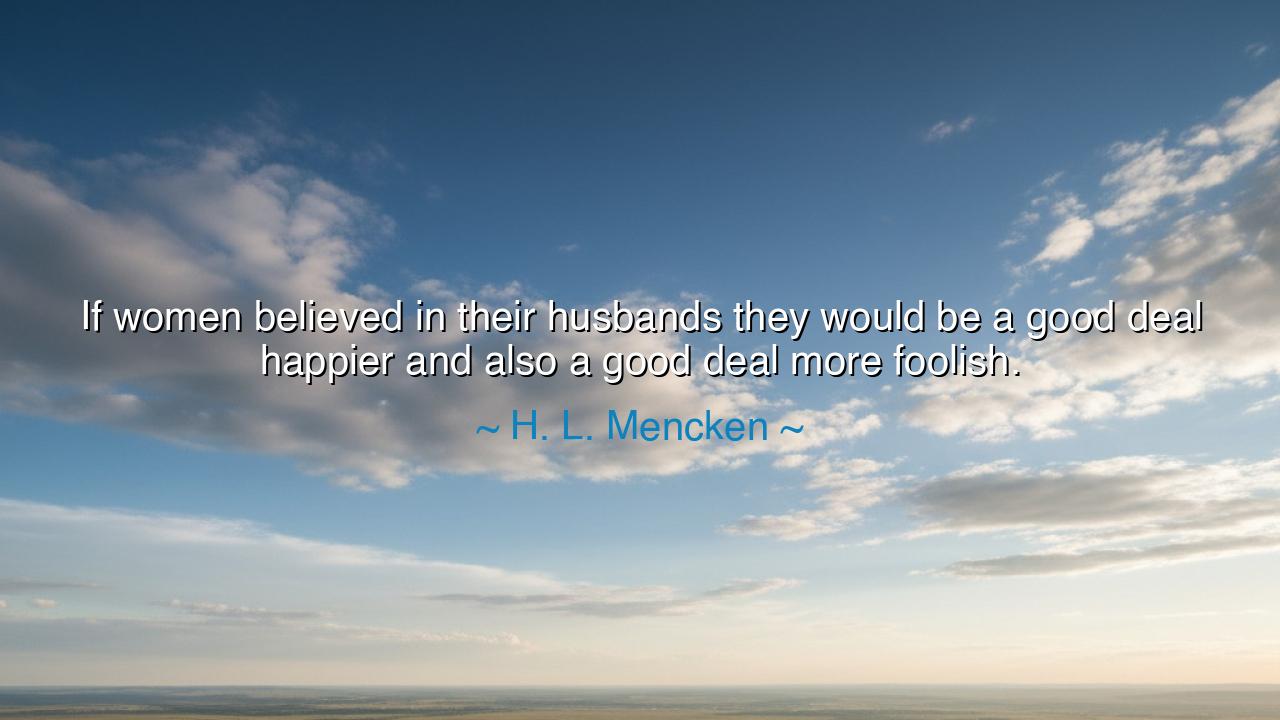
If women believed in their husbands they would be a good deal
If women believed in their husbands they would be a good deal happier and also a good deal more foolish.






The words of H. L. Mencken—“If women believed in their husbands they would be a good deal happier and also a good deal more foolish.”—are wrapped in wit, yet beneath them lies a profound and timeless truth about human relationships and the nature of trust. Mencken, master of irony, here reveals the tension between contentment and wisdom, between happiness that comes from unquestioning belief and the prudence that comes from skepticism. In this paradox, we glimpse the eternal struggle of the heart: whether to surrender completely in trust, or to guard against the folly of misplaced faith.
To believe in one’s husband—to hold him above reproach, to accept his words as unquestionable truth—would, in Mencken’s vision, bring happiness. For ignorance often brings comfort. If the mind never questions, the heart never worries. Many through history have lived in such blissful belief, and for them the world seemed safe, certain, and ordered. Yet Mencken reminds us that such comfort may also be folly, for human beings are flawed, their pride and weakness too great to deserve blind faith. To believe too fully in another, without discernment, is to invite disappointment and to dwell in illusions.
The ancients knew this duality well. Consider the tale of Penelope, wife of Odysseus. She loved her husband deeply, but she did not simply believe in him blindly. For twenty long years she tested those who came to her, weaving and unweaving her shroud, guarding her household with cunning. Had she been naive, trusting any man who claimed to be her husband, she would have been deceived and destroyed. But her balance of love and prudence saved her. In her wisdom, we see Mencken’s warning: happiness without wisdom may end in ruin.
History offers countless examples where misplaced belief led to folly. Queens who trusted scheming kings, wives who believed in unfaithful husbands, peoples who believed in leaders who betrayed them—all found that blind trust is no foundation for lasting joy. Yet on the other hand, there are also those who found harmony and deep happiness by trusting wisely, not blindly—by giving loyalty, but not surrendering judgment. Thus, Mencken’s paradox stands: too much belief may bring fleeting happiness, but wisdom demands a measure of doubt.
The power of Mencken’s words also lies in their subtle defense of women’s discernment. In his time, and even in ours, women were often told that their role was to support, to trust, to believe. Mencken flips this expectation, declaring that women’s skepticism—far from being a flaw—is in fact a mark of intelligence and strength. To see clearly, to question honestly, is to avoid the foolishness that comes from blind devotion. Thus, in his irony lies respect: he acknowledges the wisdom of women who balance love with clear eyes.
The lesson for us is plain: in relationships—whether of marriage, friendship, or leadership—belief must be tempered with discernment. To give trust is noble, but to give it without thought is folly. Happiness built upon illusions is fragile, but happiness built upon truth endures. Mencken’s words remind us that to love wisely is greater than to love blindly, for wisdom protects love from decay.
Practically, this means cultivating openness without naivety. Believe in others enough to build bonds, but not so fully that you abandon your judgment. Ask questions, look for consistency between word and deed, and remember that respect grows stronger when it is mutual and earned. Women—and men alike—are happiest not when they live in blind belief, but when they live in relationships founded on truth, respect, and wisdom.
So let Mencken’s ironic wisdom echo through the ages: “If women believed in their husbands they would be happier—and more foolish.” The task is to seek a higher form of happiness: one not born of illusion, but of truth. For true joy is not the fragile comfort of unquestioning faith, but the enduring strength of love that sees clearly, questions wisely, and yet chooses to remain.






AAdministratorAdministrator
Welcome, honored guests. Please leave a comment, we will respond soon